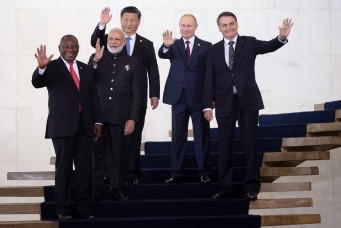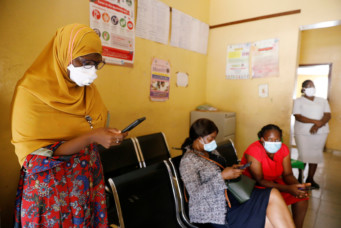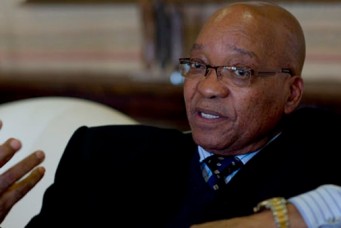South Africa after Covid-19: Recovery or Recession
South Africa has had a plethora of economic plans, but most have not been implemented

As former South African Reserve Bank Deputy Governor Ian Plenderleith said in his valedictory address in May 2007, “South Africans are great at formulating plans, but lousy in terms of implementing them.” The National Development Plan launched in 2012 is an excellent planning document, but after eight years of state capture there is very little to show, as per capita economic growth has fallen consistently since 2011 instead of improving. The collection of essays in Recession, Recovery & Reform: South Africa after Covid-19, the book edited by Professor Raymond Parson from the North-West University School of Business and Governance, was conceived before the Covid-19 pandemic as an attempt to address the declining economic growth rate. A small multi-stakeholder working group convened by the National Economic Development and Labour Council (Nedlac) has since been set up to finalize South Africa’s Covid-19 economic recovery plan. The question is, will the policymakers accept these recommendations? Will they ensure that, this time, it will be different and turn plans into actions? After all, Nedlac, which groups together government, business, labor, and civil society, must implement any recovery plan.
The book itself is a hybrid between an academic tract and a popular read. So, while the essays themselves are easy to read, the authors were meticulous in backing up their recommendations with extensive endnotes and providing a large bibliography for further reading.
Preface
In his preface, Parsons sets out the reason for this collection of essays and what they hope to achieve in terms of finding South Africa’s way forward. In essence the book asks, “how can we build on our strengths and remedy our weaknesses as a country in order to create a better life for all?” While covering a wide range of topics, the book’s core message is, what comes next, and how? What reforms need to be implemented to lead to a recovery that will result in a more just, inclusive, and resilient economy?
Law and the economy through a social-justice lens
In her essay, former Public Protector Thuli Madonsela explores what the just implementation of the law can do for marginalized members of South African society. She asks whether we can ignore the plea for social justice of informal hawker Palesa Musa, who said that poverty today limits freedom in the same way past laws did during apartheid. That reminded Madonsela of an African proverb about debating whether the leopard chasing you is male or female. In other words, we should focus less on assigning blame for the lack of economic growth and more on how to escape the leopard and ensure a rapid and sustainable recovery from the Covid-19 pandemic. “If we want peace we must work for justice, including social justice. And if we want rapid and sustainable economic development we must be prepared to design and implement laws that disrupt the toxic socioeconomic relations that we inherited from the past,” she writes.
The media and the markets
In his essay, Business Day editor Lukanyo Mnyanda examines the role of the free press, which he argues is facing an existential crisis. While advertising revenue is sucked away by the offshore behemoths of Google and Facebook, newsrooms now are increasingly occupied by junior, and therefore lower paid, reporters who do not have much knowledge and experience. In addition, social distancing rules and time constraints mean that many reporters sit at home and are unable to cultivate the contacts that result in breaking news exclusives, but rather regurgitate company media briefings without any critical interrogation. That is why the Steinhoff accounting scandal went largely unreported, even though Business Day investigative reporter David Gleason had raised questions about its accounts as long ago as 2013 in his Torque column.
“Financial journalism’s failings are structural in nature, driven by business models that have emphasized cost-cutting over quality,” Mnyanda writes. Unless this is fixed, more scandals will take place with dire consequences, such as value destruction of scandal-hit shares and lack of trust in auditors and the Johannesburg Stock Exchange for both investors and society as a whole.
A jobs policy for greater inclusion
In their essay, Antony Altbeker and Ann Bernstein from the Centre for Development and Enterprise make the case that urgent labor market reform is necessary to include the third of the population that is currently unemployed in the workforce. This can be done by relaxing onerous regulations on firing, which make employers reluctant to hire candidates in the first place in case the employees do not fit into the team or are otherwise incompetent. Altbeker and Bernstein also say that the education system needs to be overhauled so that the end product is fit for purpose, instead of having graduates sitting at home with degrees that hold no value for employers. The proposed reforms would result in an economy that is globally competitive and embraces the Fourth Industrial Revolution. “This will require a range of reforms, many of which go against the grain of the ruling party’s current approach to the economy,” they point out. In the short term, “accelerating growth must be at the core of any programme to increase employment.”
Making economic transformation work
In his essay, Bonang Mohale, former chief executive officer of Business Leadership South Africa, points out that economic transformation policies are necessary to create a more inclusive society. Implementing these policies will take immense courage and will on the part of the partners in Nedlac. Mohale quotes U.S. Army General George Patton, who said, “great wars are won by great execution, not great plans, because good execution will save even a mediocre plan.”
South Africa’s fiscal crisis: Is there a way back from the brink?
In his essay, former Industrial Development Corporation Chief Economist Lumkile Mondi sketches the history of South Africa’s economic plans from the 1993 Reconstruction and Development Programme to the October 2019 proposals by the National Treasury for boosting growth. He stresses that in order to pull South Africa back from a fiscal cliff, there must be rapid implementation of policies that boost growth. “It is time to practice an inclusive, low-carbon form of capitalism which addresses its problems head on, in partnership with a capable, effective and efficient regime,” he writes.
Why does South Africa have inflation targeting?
In his essay, former Nedbank Chief Economist Dennis Dykes explains the background on why inflation targeting was introduced in 2000 in South Africa, a decade after the Reserve Bank of New Zealand implemented the policy. As a good ambidextrous economist, Dykes on the one hand shows what inflation targeting has done to anchor inflation expectations and on the other hand shows what critics of the policy say is wrong with it. His conclusion is that it should be retained as a crucial monetary policy. “The view in some quarters that inflation targeting has resulted in too tight a monetary stance, given the country’s negligible growth rate, seems misplaced. Low economic growth in South Africa has had much more to do with a lack of fundamental structural reforms, a lack of policy consistency and poor implementation,” he writes.
Banking on the future: The banking sector in South Africa
In his essay, the former managing director of the Banking Association of South Africa and current chief executive officer of Business Unity South Africa, Cas Coovadia, details the steps the banking sector took to reform and recover after the 2008 Global Financial Crisis. These reforms have made the banking sector more resilient, but without a rapid recovery in economic growth, the sector will remain under stress. “Despite the resilience of the South African banking sector, it is not immune from the downside risks that confront the economy,” he writes. That is why he urges rapid structural reforms to avoid further stagnation.
The emerging role of business: From outsider to strategic partner
In her essay, Tanya Cohen, the former chief executive officer of Business Unity South Africa, explores the often fraught relationship between organized business and the government. She notes that the period 2000–2007 was characterized by sustained economic growth, which created an environment enabling economic participation by previously excluded groups. After the Global Financial Crisis and the ensuing failure to return to the high growth rates of the 2000–2007 period, the ruling party reverted to the blame game as it lost electoral support. “White monopoly capital” was wrongfully blamed for South Africa’s growing unemployment crisis and endemic inequality.
After the December 2015 firing of Finance Minister Nhlanhla Nene and the crisis of confidence this invoked among foreign investors, organized business became more vocal about the need to stop corruption and state capture. Since the election of President Cyril Ramaphosa in February 2018, organized business has engaged more constructively with the government and become more of a strategic partner rather than an adversary. As such, organized business will help with addressing the problems of power supply, measures to restore fiscal stability, investment, and maintenance of infrastructure, while aiming for policy certainty and coherence so that South Africa can return to an environment enabling high growth that provides a better life for all.
A free market for a more prosperous South Africa
In his essay, Temba Nolutshungu, a director of the Free Market Foundation, details his personal experiences of oppression during apartheid, which instilled in him a burning desire to advance the liberty and equality of all people. He notes that people in the former Soviet satellite states have chosen economic freedom, and that eight former communist countries now rank in the top thirty most economically free countries in the world with high economic growth. By contrast, South Africa has fallen from the forty-seventh position in 2010 to 101st in 2017. As a result, economic growth has also consistently slowed as economic freedom was curtailed. Nolutshungu quotes Mahatma Gandhi, who said, “I look upon an increase of the power of the state with the greatest fear, because while apparently doing good by minimizing exploitation, it does the greatest harm to mankind by destroying individuality which lies at the root of all progress.”
Productivity: The catalyst for competitiveness and sustainable growth
This essay by Mothunye Mothiba, the chief executive officer of Productivity SA, and Mthunzi Mdawaba, the chairman of Productivity SA, notes that the Ramaphosa presidency has been underpinned by a stated commitment to work with social partners to address the challenges facing South Africa while simultaneously eradicating pervasive corruption. “However pronouncements alone, without tangible and decisive action manifesting in effective implementation, are not enough,” they write. What is required in their opinion is a change in mindset to one of continuous improvement, which is encapsulated in the Japanese word kaizen, the concept of continuous small improvements initiated by employees from the assembly line worker to the chief executive officer. “As the Fourth Industrial Revolution gathers momentum, South Africa is under even more pressure to ensure that large and small enterprises alike are competitive, profitable and a sustainable source of productive and decent employment,” they conclude.
Evolution of South Africa’s land-reform process post-1994
This essay by USAID Agricultural Economist Tinashe Kapuya and Agricultural Business Chamber of South Africa Chief Economist Wandile Sihlobo notes that South Africa in many ways failed to meet the criteria for a successful land reform program set at a World Bank workshop in 1992. Namely, the implementation of the program should be rapid, the role of the public sector should be clearly defined, and it should be part of a comprehensive program of economic reconstruction.
In particular, the authors note that the system of land tenure, especially for rural dwellers, has not changed since 1994, largely due to the state’s failure to pass legislation to improve tenure security. Some progress has been made, as about 2.1 million people have benefited from the land restitution pillar, but women have not benefited significantly, as only 7.8 percent of beneficiaries have been women. Given the need to recover and reform after the Covid-19 pandemic, the authors say a more collaborative approach to tackling the land issue could be one way to achieve sustainable growth.
The township economy in post-apartheid South Africa
This essay by Fulu Netswera, the dean of the Faculty of Management Sciences at the Durban University of Technology, says that one of the most urgent challenges facing South Africa is getting the township economy working. In Netswera’s view, the township economy is a sleeping giant and has been neglected for far too long by policy makers. “Hopefully, though, we can move beyond political rhetoric to a point where government becomes an active partner in creating the right conditions for entrepreneurial activity to thrive,” he writes.
The political economy of giving economic advice
As editor, Parsons has the opportunity to have the last word, and in his essay, he says that recovery and reform depend on the willingness and capacity of policymakers to turn sound advice into actionable policy. He references Good Economics for Hard Times by Nobel Laureates Abhijit Banerjee and Esther Duflo in determining what works and what does not work in terms of economic policymaking advice. An eighteen-member Presidential Economic Advisory Council (PEAC) was announced in September 2019, and it was tasked with giving President Cyril Ramaphosa sound economic advice. To succeed in this task, Parsons says that at the outset it will be necessary to have realistic expectations as to what the advisory body can deliver within its mandate. That means it should avoid suggestions based on ideology rather than evidence. That is why he says structural reform should be seen as a marathon, not a sprint. “The PEAC could therefore underpin its implementation mandate by helping to entrench a systematic culture of setting timetables agreed growth reforms wherever feasible, and calling for progress reports,” he writes.
Helmo Preuss is a freelance writer on economics for publications such as Alliance News, Business Day, Business Report, Grocott’s Mail, Nerve, and The BRICS Post.
Prior to that he was the chief economist at Oasis Asset Management, the economics analyst at Statistics South Africa, the economics editor at real-time financial news service I-Net Bridge, chief economist at Gencor, and an industrial engineer at Iscor.
He is currently a Ph.D. candidate in Economics at the Nelson Mandela University.
Read MoreSubscribe to Our Newsletter





